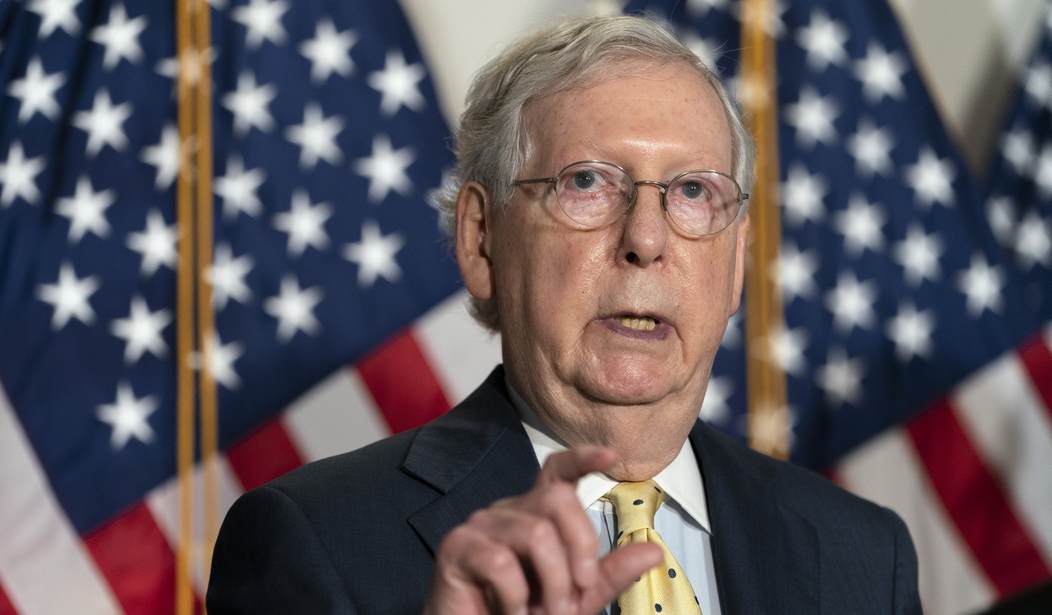He fights.
Let me be perfectly clear: there will be no bipartisan USICA as long as Democrats are pursuing a partisan reconciliation bill.
— Leader McConnell (@LeaderMcConnell) June 30, 2022
It’s interesting that he’s playing hardball with Joe Manchin and Kyrsten Sinema on a day when Sinema reaffirmed that she won’t end the filibuster to codify abortion rights, and just a week after she helped broker a deal on guns. She’s risked her career by insisting that bipartisan compromise is not only possible but necessary. Now here’s Mitch telling her that if she goes along with Schumer’s plan to pass a watered-down version of Build Back Better, the GOP’s interest in a bipartisan USICA bill — a Chinese-competition initiative to subsidize America’s semiconductor industry — will be dead.
Care to guess, by the way, whose home state has a keen interest in the health of the semiconductor industry?
Dems can have the skinny BBB bill or USICA but they can’t have both. Not with Republican votes, at least.
The China competitiveness bill has been the subject of negotiations for months and is being closely watched by industry groups — particularly automakers — because it includes funding for the development of semiconducter chips that are in short supply.
House and Senate Democrats have been at odds over the proposal, stalling its progress, but the Kentucky Republican’s threat could sink the effort altogether…
Justin Goodman, a spokesman for Schumer, responded to McConnell’s threat, saying: “Sen. McConnell is holding American jobs in key US industries hostage to help China and protect his friends in big pharma allowing them to keep screwing over Americans with outrageously high Rx drug prices.”
Heh. Not that long ago, Mitch was firmly against legislative hostage-taking:
McConnell 6/28/21, on infrastructure: “The President cannot let congressional Democrats hold a bipartisan bill hostage over a separate and partisan process.”
McConnell 6/30/22: “there will be no bipartisan USICA as long as Democrats are pursuing a partisan reconciliation bill.”
— Edward-Isaac Dovere (@IsaacDovere) June 30, 2022
I think Jimmy Quinn is right about what McConnell’s play here is. Schumer and Manchin are suddenly close to a deal on a scaled-down BBB bill that would reduce prescription drug costs for seniors, with Democrats hoping to pass the bill by the end of July. The House and Senate, meanwhile, have each already passed their own versions of USICA, a bill which the public broadly understands is necessary to shore up America’s supply chain. As Quinn says, McConnell is essentially daring Schumer and Biden to choose their economic bill over the Chinese-competition bill and then explain to voters why more domestic spending in an age of high inflation is of greater urgency than catching up to China in the important economic niche of semiconductor production.
There are risks to that play, though. Reducing prescription drug prices, which Mitch is trying to thwart, is destined to be popular. And if USICA tanks because Republicans won’t go along, it could mean that a new semiconductor plant that Intel is planning to build in Ohio will fall through.
No USICA could mean no CHIPS Act, which would directly impact Ohio.@intel has already delayed the groundbreaking of its new computer chip factories in Licking County because this legislation has been stalled in Congress.
If negotiations fall apart, unclear what happens next. https://t.co/l9YTjnfDTF
— Taylor Popielarz (@TaylorPopielarz) June 30, 2022
J.D. Vance would be left to explain to voters this fall why McConnell balked at the last second at a bill that would have brought jobs to the state.
But Mitch is willing to risk that in order to call Biden’s, Schumer’s, Manchin’s, and Sinema’s bluffs. What do Dems do now?
One thing they could do is try to fold USICA into the new BBB bill and pass it with Democratic votes exclusively, but their ability to do so would depend on the Senate parliamentarian. The parliamentarian scrutinizes each element of a reconciliation bill to ensure that that element bears directly on the federal budget. If it doesn’t, it can’t be passed via reconciliation. Dems are already nervous that parts of the drug-pricing bill will run afoul of that rule, foiling their attempt to pass it with just 50 votes. What happens when USICA gets the same analysis? Would legislation that provides $50 billion for the semiconductor industry qualify? “[U]nder the budget rules they are using regulatory and foreign policy aspects of the China bill would likely not be allowed in,” Bloomberg reports.
Also, if USICA ends up in the BBB bill, it will drive up the cost. Reconciliation legislation needs to be deficit-neutral (or deficit-reducing), so Dems would need to find offsets somewhere to cover the tab.
They have another option, though. Instead of the House and Senate compromising on a USICA bill that’s acceptable to both bodies, Pelosi could simply pass the Senate version of the USICA bill that passed in March. There’s nothing McConnell can do to stop that. If House Dems are willing to eat it on that legislation, the Senate USICA bill would become law *and* the Senate could then proceed with reconciliation for BBB without McConnell holding anything over their heads. Liam Donovan thinks that may be the way Mitch is leaning here. Either Schumer will ditch BBB or Pelosi will have to pass a more Republican-friendly version of the Chinese-competition legislation:
Indeed, and I think Rs would find these terms acceptable. https://t.co/PCNhKggq4D
— Liam Donovan (@LPDonovan) June 30, 2022
This is one where Rs are content to let the CHIPS (😏) fall where they may. Manchin seems reasonable committed to getting to yes hear. And regardless of how this turns out, Rs would be perfectly fine with getting the funding they want without having to actively facilitate it. https://t.co/0yRJVMAyzz
— Liam Donovan (@LPDonovan) June 30, 2022
Frankly, given the size of the red wave that’s gathering offshore, McConnell has no great incentive to reach a USICA deal with Dems. If Pelosi doesn’t want to pass the Senate version of the bill, Mitch will kick back for six months, wait for the new Republican majorities to be seated, and then dictate his terms for a new bill written by Republicans to Biden. If Biden says no, the White House can explain to voters why helping America gain self-sufficiency in semiconductor production is no longer a priority.
Still, delay wouldn’t be great for the Intel factory in Ohio. There are sound reasons why the bill should pass sooner rather than later. McConnell just wants to see if he can make Dems blink on BBB in the name of making passage happen.








Join the conversation as a VIP Member